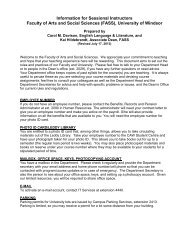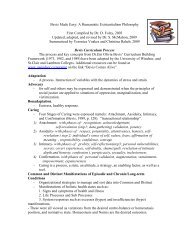No Exit: Racial Profiling and The War Against Terrorism
No Exit: Racial Profiling and The War Against Terrorism
No Exit: Racial Profiling and The War Against Terrorism
You also want an ePaper? Increase the reach of your titles
YUMPU automatically turns print PDFs into web optimized ePapers that Google loves.
41 OSGHLJ 293 Page 8<br />
41 Osgoode Hall L.J. 293<br />
ond prejudice. However, such a transformation project requires self-scrutiny <strong>and</strong> introspection: we must examine<br />
ourselves <strong>and</strong> examine our assumptions. <strong>The</strong>rein lies the problem. Rather than making plain our preconceived assumptions<br />
<strong>and</strong> invalidating stereotypes in decision making, racial profiling does the opposite: it instructs decision makers to<br />
operate on the basis of an ingrained assumption that Arabs <strong>and</strong> Muslims are terrorists, thus perpetuating decision making<br />
on the basis of stereotypes.<br />
Perhaps the concern that profiling will lapse into stereotyping is most obvious in relation to justifications for profiling<br />
that rely on the claim that Arab <strong>and</strong> Muslims are culturally [FN59] or statistically [FN60] more inclined to violence<br />
<strong>and</strong> terrorism than other members of Canadian society. However, it also applies to the narrower claim that racial profiling<br />
is justified because individuals responsible for 9/11 remain at large <strong>and</strong> that it is thus reasonable to focus investigations<br />
<strong>and</strong> prevention efforts on Arab <strong>and</strong> Muslim communities for the purpose of identifying those within the community<br />
who may be connected to Al Qaeda. [FN61] Regardless of the justification advanced, decision makers are still given permission<br />
to single out Arabs <strong>and</strong> Muslims for special scrutiny. If a woman wearing hejab approaches airport security, for<br />
example, racial profiling instructs security personnel to ask themselves questions like “Is this Muslim woman linked to<br />
Al Qaeda? Does she have information about Al Qaeda? Is she more of a security risk than the Danish woman st<strong>and</strong>ing<br />
behind her? Was she involved in 9/11? Does she have information about 9/11?” While different *308 proponents of racial<br />
profiling suggest different reasons to justify these questions in the decision maker's mind, in the end, they all require<br />
that the Muslim woman be treated with heightened suspicion.<br />
Where there is a perceived link between an individual's race <strong>and</strong> the particular crime, or incident under consideration,<br />
apublicpolicythatgrantsdecisionmakerspermissiontoregardmembersofthatracewithheightenedsuspicionproves<br />
highly problematic. [FN62] Given the long-st<strong>and</strong>ing belief that existed well before 9/11 that Arabs <strong>and</strong> Muslims are generally<br />
more inclined towards violence than other groups, racial profiling of Arabs <strong>and</strong> Muslims as risks to national security<br />
are not easily disentangled from stereotyping. A decision maker's perceptions of a particular group's propensity towards<br />
crime impacts upon their analysis of who reasonably should be considered a suspect in any particular case. Numerous<br />
studies of racial profiling of African Americans illustrate this point. [FN63]<br />
Where racial profiling is employed in “Driving While Black” cases, virtually all male members of the community<br />
driving in a given area become possible suspects in the quest to solve a specific crime. [FN64] In many instances, it is<br />
difficult to determine with any precision the extent to which law enforcement officers single out an individual member of<br />
agivencommunityoutofaconvictionthattheindividual,asamemberofthecommunity,hasapropensitytowards<br />
crime, or whether officials have sufficient information to link the individual to a specific crime. [FN65] This problem is<br />
compounded in cases involving international investigations, sleeper cells, amorphous actors, <strong>and</strong> global terrorist networks.<br />
Ultimately, the irrational stereotype overtakes the purportedly rational profile.<br />
Those who argue in favour of racial profiling fail to adequately take ingrained social stereotypes into consideration.<br />
While they might acknowledge that the racism of individual decision makers may impede rational decision making, they<br />
cannot account for widespread societal bias. [FN66] <strong>Profiling</strong> may be an important part of law enforcement <strong>and</strong> officials<br />
may use some statistical profiles (men are more likely to commit violent *309 crimes than women, for example) without<br />
controversy, however, racial profiling represents a different problem altogether.<br />
While some supporters of profiling contend that members of a targeted community have nothing to fear from profiling<br />
because they will be exonerated if they are innocent, this is not necessarily the case. [FN67] <strong>The</strong> risk is that decision<br />
makers who believe themselves faced with sleeper cells <strong>and</strong> international conspiracies will interpret the facts before them<br />
through the lens of fear <strong>and</strong> will adopt a “better safe than sorry” [FN68] mentality whereby it is better to violate<br />
someone's rights than risk a terrorist incident. Over time, we become comfortable with our prejudices <strong>and</strong> determinations<br />
© 2010 Thomson Reuters. <strong>No</strong> Claim to Orig. US Gov. Works.





